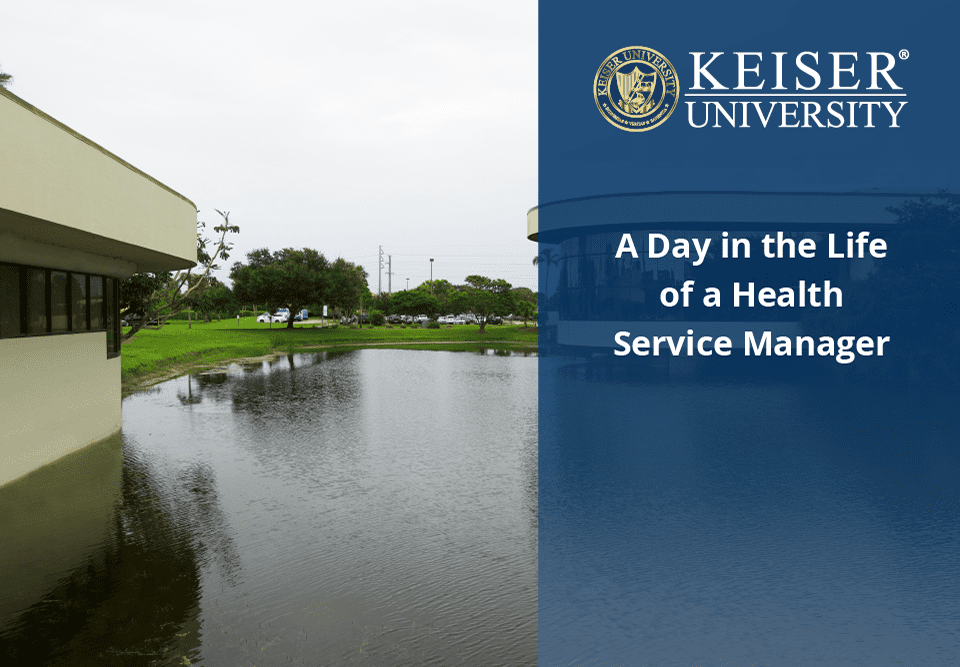Have you ever thought about working on the administrative side of healthcare? Do you enjoy leading others? A healthcare management career might appeal to you. Even if you are currently in a clinical role within the field, you could make a career pivot with the right education and training.
What does a day in the life of a health service manager look like, then? Dive in to learn more and about this path.
What Is a Health Services Manager?
A health service manager, also known as a medical service manager, plays an integral role in keeping the modern healthcare system running as efficiently as possible.
Definition and Role Within the Healthcare System
More specifically, health services managers take on the bulk of the “business side” of operating a healthcare facility (e.g., a hospital or physician’s office). They provide valuable administrative and strategic services, tackling key responsibilities such as:
- Scheduling employees to ensure proper coverage.
- Preparing and monitoring facility budgets.
- Ensuring facility operations align with compliance regulations.
- Strategic planning and goal-setting.
- Recruiting, hiring and training staff.
Importance of Healthcare Administrators in Patient Care Delivery
Despite their administrative role, the work of health service managers can have a direct impact on the care patients receive. Through their careful strategic planning, budgeting, hiring and decision-making, health services managers bolster operational efficiency and resource allocation. This can therefore ensure that patients are treated with the highest standard of care at all times.
How to Become a Health Service Manager
Interested in working as a health service manager? You will want to seek the optimal combination of formal education and experience to enter this field.
Recommended Educational Background
According to the United States Bureau of Labor Statistics (BLS), health service managers generally need a minimum of a bachelor’s degree in a related field to enter the occupation. However, some employers may prefer to hire applicants with a master’s degree in an adjacent discipline, like health science or health services administration.
Years of Experience and Areas of Specialization
Likewise, having experience working in other administrative roles within a hospital or healthcare facility can be useful when applying for health service manager positions. Some professionals in this field may also choose to specialize in a certain area, such as medical records, budgeting or health informatics. Over time and with enough experience, health service managers might even work their way into executive roles.
Morning: Prioritizing Patient Care Through Operations
Although no two days working in healthcare administration are identical, many days start with reviewing data and reports before moving into the various other responsibilities of a health service manager.
Daily Reports and Patient Data
Upon arriving in their offices, health service managers may review any reports or data that have been generated overnight. Setting the tone (and priorities) for the day, this might include information about:
- Patient care and treatment
- Billing
- Resource management
- Incident reports
Managing Staffing Schedules and Shift Coverage
The beginning of a health service manager’s shift is also a good time to review staffing plans for the day. This includes checking to see if there have been any call-offs and, if so, taking measures to fill shifts as necessary.
Midday: Team Leadership and Administrative Duties
As health service managers move into the bulk of their day, they may find themselves attending meetings and collaborating with medical staff.
Team Meetings and Interdepartmental Coordination
Daily meetings with department leaders can be an ideal time to share relevant information, address concerns and keep everyone on the same page across different departments. Depending on the size of the team and medical facility, these meetings may happen daily or once every few days.
Communicating With Medical Staff and Administrative Personnel
Throughout the day, health service managers might check in with medical staff and other administrative personnel to address problems, ask questions and provide guidance. This can be an excellent way for leaders to see how efficiently a facility is operating first-hand while also building stronger relationships with team members.
Monitoring Budgets, Billing and Patient Services
Ensuring that facilities are operating on budget is another essential responsibility among health service managers. Regular check-ins with billing and patient services verify that the facility is receiving payments for services rendered.
Afternoon: Compliance, Strategy and Planning
Regulatory compliance is a central component of a health service manager’s job, and a fair share of each day may be spent confirming certain standards are being met.
Reviewing Policies for Regulatory Compliance
Health service managers are responsible for ensuring that their facilities and teams follow healthcare laws and regulations, including the Health Insurance Portability and Accountability Act (HIPAA) and Joint Commission on Accreditation of Healthcare Organizations (JCAHO) standards.
Assessing Quality Assurance and Patient Satisfaction Metrics
Medical service managers may take time out of their day to review patient satisfaction metrics, too, including results from patient surveys and other relevant data. This information can be used for quality assurance purposes as well as future improvements to training and staff development.
Strategic Planning and Aligning With Institutional Goals
At the end of the day, health service managers need to ensure that the plans, policies and procedures their facilities have in place align with long-term institutional goals and objectives. In turn, these professionals can be sure they are carrying out the most important duty of the job.
Skills That Define a Successful Health Service Manager
So, what is a health services manager’s skill set for success? In addition to a solid understanding of the healthcare industry, professionals in this line of work benefit from strong leadership, communication, time management and analytical thinking skills.
Leadership and Communication
Health service managers are often in charge of overseeing departments or even entire medical facilities, so healthcare leadership skills are a must for keeping team members motivated. Effective communication is also critical to building rapport and ensuring team members are informed.
Time Management and Multitasking
Working as a health service manager means juggling numerous responsibilities at once. From budget planning and scheduling to compliance and everyday healthcare operations, these professionals have a lot on their plates and must be able to manage their time as efficiently as possible.
Analytical Thinking and Decision-Making in a Fast-Paced Environment
Health service managers frequently handle large volumes of data, working to extract insights from raw data that can inform future strategy and operations. In this sense, excellent analytical thinking and decision-making skills can prove invaluable.
How to Become a Health Service Manager
Education and training are crucial elements to entering the field as a health service manager. Even with the right degree under your belt, though, these professionals should be committed to a lifetime of ongoing learning and professional development.
Recommended Degrees: Bachelor’s, Master’s and Post-Grad
A bachelor’s degree is the minimum education required to become a health services manager, but many employers prefer candidates with a master’s degree in a related field. For those seeking to move into even more advanced roles, such as those at the executive leadership level, a terminal degree (such as a Doctor of Health Science) may be preferred.
Internships and Healthcare Admin Experience
Having previous experience in healthcare administration — e.g., working in medical records or even as an administrative assistant — can be valuable when it comes to building essential skills for health service managers. If you do not have this experience, many schools may offer assistance in securing relevant internship experiences with local hospitals or other healthcare facilities during a degree program.
Importance of Continuing Education and Leadership Development
Because the healthcare industry is constantly evolving, health service managers should stay on top of the latest news and trends in order to do their jobs and lead teams effectively. This is especially true in regard to staying up to date on changing industry compliance regulations as well as new tools and technologies (like AI and other automation tools) that can aid health service managers in their work.
FAQs About Health Service Management Careers
What does a typical day look like for a health service manager?
This can vary from one workplace to the next, but most health service managers begin their day by reviewing reports and patient data before moving into team meetings and reviewing budgets. Near the end of the day, health service managers may review key quality metrics for their facilities and assess progress toward institutional goals.
What skills are most important in this role?
Health service managers who succeed in these roles tend to possess a range of technical skills and core competencies, including a firm grasp of healthcare industry regulations (like HIPAA and JCAHO). Additionally, these professionals need to hone strong leadership, communication, time management and analytical decision-making skills in a fast-paced work environment.
Do health service managers work directly with patients?
No, health service managers do not work directly with patients. However, their daily work can have a significant impact on the quality of care patients receive — especially related to staffing, budget management and policies.
Take the Next Step in a Health Science Degree Program
No matter if you are currently working in the clinical side of healthcare and looking to pivot into administration — or you simply want to take your health science education to the next level — an advanced degree can help you build valuable skills needed to thrive in a health services manager role.
Keiser University’s Doctor of Health Science (DHSc) degree is designed to help students pursue healthcare administration and leadership positions while contributing to the field’s body of knowledge in meaningful ways. If you do not yet hold a master’s degree, we also offer an MBA in Health Services Administration that can serve as a solid foundation for a future DHSc.
Learn more about either of these programs by contacting a graduate admissions counselor or getting started with your application today.
So urces
https://www.keiseruniversity.edu/doctor-health-science-dhsc/
https://www.keiseruniversity.edu/master-business-administration-mba-health-services-administration/
https://www.hhs.gov/hipaa/index.html
www.bls.gov/ooh/management/medical-and-health-services-managers.htm
https://pmc.ncbi.nlm.nih.gov/articles/PMC10955674/
https://pmc.ncbi.nlm.nih.gov/articles/PMC9518077/
https://pmc.ncbi.nlm.nih.gov/articles/PMC5810660/
https://www.ncbi.nlm.nih.gov/books/NBK589707/
https://journals.sagepub.com/doi/10.1177/08404704211063584
https://www.aha.org/case-studies/2015-06-17-daily-operations-reports






 The instructors at Keiser University impacted my life. They believed in my ability to become a great graphic designer, regardless of how I felt about my skills. KU helped to prepare me for the real world and got me to where I am today.
The instructors at Keiser University impacted my life. They believed in my ability to become a great graphic designer, regardless of how I felt about my skills. KU helped to prepare me for the real world and got me to where I am today.
